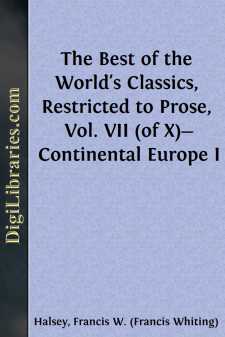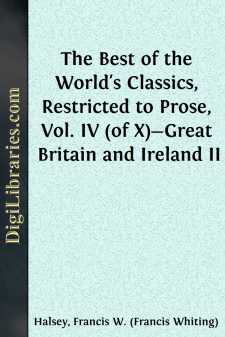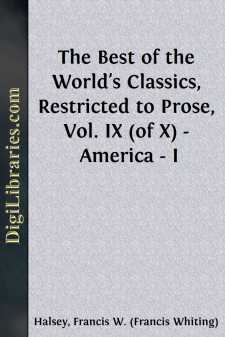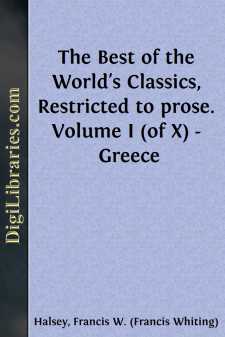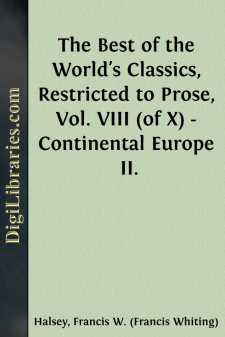Categories
- Antiques & Collectibles 13
- Architecture 36
- Art 48
- Bibles 22
- Biography & Autobiography 813
- Body, Mind & Spirit 141
- Business & Economics 28
- Children's Books 12
- Children's Fiction 9
- Computers 4
- Cooking 94
- Crafts & Hobbies 4
- Drama 346
- Education 46
- Family & Relationships 57
- Fiction 11826
- Games 19
- Gardening 17
- Health & Fitness 34
- History 1377
- House & Home 1
- Humor 147
- Juvenile Fiction 1873
- Juvenile Nonfiction 202
- Language Arts & Disciplines 88
- Law 16
- Literary Collections 686
- Literary Criticism 179
- Mathematics 13
- Medical 41
- Music 40
- Nature 179
- Non-Classifiable 1768
- Performing Arts 7
- Periodicals 1453
- Philosophy 64
- Photography 2
- Poetry 896
- Political Science 203
- Psychology 42
- Reference 154
- Religion 513
- Science 126
- Self-Help 83
- Social Science 81
- Sports & Recreation 34
- Study Aids 3
- Technology & Engineering 59
- Transportation 23
- Travel 463
- True Crime 29
The Best of the World's Classics, Restricted to Prose, Vol. VII (of X)-Continental Europe I
Categories:
Description:
Excerpt
IMPERIAL POWER FOR GOOD AND BAD MEN
Let us examine the nature of the spaciousness and continuance of empire, for which men give their gods such great thanks; to whom also they exhibited plays (that were so filthy both in actors and the action) without any offense of honesty. But, first, I would make a little inquiry, seeing you can not show such estates to be anyway happy, as are in continual wars, being still in terror, trouble, and guilt of shedding human blood, tho it be their foes; what reason then or what wisdom shall any man show in glorying in the largeness of empire, all their joy being but as a glass, bright and brittle, and evermore in fear and danger of breaking? To dive the deeper into this matter, let us not give the sails of our souls to every air of human breath, nor suffer our understanding's eye to be smoked up with the fumes of vain words, concerning kingdoms, provinces, nations, or so. No, let us take two men, let us imagine the one to be poor, or but of a mean estate, the other potent and wealthy; but withal, let my wealthy man take with him fears, sorrows, covetousness, suspicion, disquiet, contentions,—let these be the books for him to hold in the augmentation of his estate, and with all the increase of those cares, together with his estate; and let my poor man take with him, sufficiency with little, love of kindred, neighbors, friends, joyous peace, peaceful religion, soundness of body, sincereness of heart, abstinence of diet, chastity of carriage, and security of conscience.
Where should a man find any one so sottish as would make a doubt which of these to prefer in his choice? Well, then, even as we have done with these two men, so let us do with two families, two nations, or two kingdoms. Lay them both to the line of equity; which done, and duly considered, when it is done, here doth vanity lie bare to the view, and there shines felicity. Wherefore it is more convenient that such as fear and follow the law of the true God should have the swaying of such empires; not so much for themselves, their piety and their honesty (God's admired gifts) will suffice them, both to the enjoying of true felicity in this life and the attaining of that eternal and true felicity in the next. So that here upon earth, the rule and regality that is given to the good man does not return him so much good as it does to those that are under this his rule and regality. But, contrariwise, the government of the wicked harms themselves far more than their subjects, for it gives themselves the greater liberty to exercise their lusts; but for their subjects, they have none but their own iniquities to answer for; for what injury soever the unrighteous master does to the righteous servant, it is no scourge for his guilt, but a trial of his virtue. And therefore he that is good is free, tho he be a slave; and he that is evil, a slave tho he be king. Nor is he slave to one man, but that which is worst of all, unto as many masters as he affects vices; according to the Scriptures, speaking thus hereof: "Of whatsoever a man is overcome, to that he is in bondage."
FOOTNOTES:
From "De Civitate Dei," Book IV, Chapter III, published in 426....


